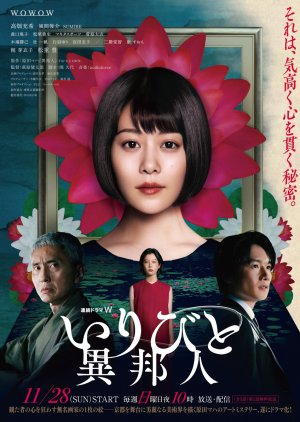
Snow during spring
"A masterpiece may be in someone's possession for a while, but once its purpose is done, it goes to the next person."Sometimes when you are looking at a work of art, many different emotions overcome you and iribito is exactly like a work of art. It can't be really explained with words. It is like a painting with vivid and dark colors that makes you feel the complexity of human nature and the beauty of human creations. Its atmosphere is unsettling and suffocating, but at the same time liberating and cruelly beautiful. Takamura Naho is mesmerizing, assertive and infatuated with art, while Shirane Tatsuru is ethereal, passionate and unbelievably creative. They complement each other in a way that resembles human creations. Those creations are made by human beings and can only be appreciated by other human beings.
Was this review helpful to you?

This review may contain spoilers
Superb drama writing, cinematography and acting
My main praise for this drama gem is definitely the writing and the cinematography along with the focus on all the details in every scene. Especially when it comes to the impact , or you could even say the relationship the FL has got or is building up with the paintings in the present and past. The several encounters with the paintings are accompanied by an intriguing soundtrack which makes it even more impressive, not to mention the careful acting of the FL.While the drama is continuously raising the tension throughout the 5 episodes also the different paintings made and shown enhance that tension along with the story perfectly. Coming from a small nature flower type to a bigger one, ending up in a painted fire hell for the one who deserves it. If that isn't enough yet, the pregnancy and final child birth works very well as a metaphoric journey to the new beginning. In addition I guess there's no other city in Japan which would fit better to the setting than Kyoto, if you can, visit and dive into all the shrines and walk around Gion.
The only mild criticism is that douche bag of a husband, which for me was a bit of a too stereotypical old school dude and the story with the mother regarding that "The Graduate" incident. I can't explain why, but to me that theme should stay with that 1967 American movie :-p It looked like they made those two especially evil so the story could reach that kind of ending, that I really liked, by the way.
But of course that got nothing to do with the actors and actresses. All of them did a stellar job in my opinion, at first to mention the FL and the villain painter, which you want to be punished by all means the first minute you recognize how he treats Shirane Tatsuru.
Now go and watch ! 5 hours very well spent !
Was this review helpful to you?

Beautiful Cinematography and Paintings + Excellent Acting
“Iribito” aka “Stranger” is a beautiful short mystery drama set in the world of art. Female lead, Naho, is pregnant but is left in Kyoto alone, while her husband and family stay in Tokyo. Feelings of abandonment and disconnect filled her and she does not feel the joy of pregnancy. But after she comes across an undiscovered talent in Tatsuru, she is adamant in introducing this genius artist to the world, no matter the cost. You slowly see how Naho changes because of this artist.Actress Takahata Mitsuki plays the introverted and depressed Naho beautifully in the first couple episodes. But her eyes light up whenever she is looking at Tatsuru’s paintings. Her character changes and grows, and you can see her true personality and how she outsmarts everyone. Surmire is so believable as the abused and mute genius artist. Her big eyes speak volumes and are able to convey so many emotions. The overall acting for the whole cast is great, and there’s no weak link. There are no over-the-top or annoying characters.
5 episodes are enough to tell this story. In the first half of the drama, I kept on thinking I needed more background information on certain relationships. But as the story unfolds, the information that I want is slowly revealed. So be patient, pay attention and wait for the twists and turns.
I am not an artist and don’t really know how to appreciate fancy art. But the paintings shown in this drama, esp. Tatsuru’s paintings can easily be appreciated by novices like me. The lighting and camera angle excellently showcase the beauty of these paintings. There are many beautiful shots of scenery or people, expertly shot that they become paintings themselves. Tatsuru’s style and size of her paintings grow throughout the drama, as she finally found someone who believes and encourages her development as an artist.
“Iritbito” is not a fast-paced drama. It’s one that you need to be in the right mood to appreciate how the plot slowly unveils the twists and turns, and with excellent and appropriate background music to set the mood. I'm giving this a rounded up 8.5.
Completed: 11/8/2022
Was this review helpful to you?

Nature mortifère
Takahata Mitsuki a le pouvoir d'éveiller ma curiosité par sa simple présence dans un drama. Rôles choisis avec soin, elle sait mettre à chaque fois une touche de folie et une grande part d'émotion dans ceux-ci, nous mettant autant le sourire aux lèvres que la larme à l'œil. Trop longtemps cantonnée aux jeunes candides aussi bien étudiante surprotégée, inexpérimentée dans la police, la médecine de campagne ou l'architecture, sa maladresse et sa fragilité l'ont rendu éminemment sympathique pour ceux qui ont un cœur et énervante pour tous les autres. Mais à maintenant 30 ans, des rôles de femmes déterminées, dans une vie active et un peu moins rose bonbon, manquaient à sa palette de couleurs. Et même, si l'ombre des couleurs de l'arc-en-ciel glisse sur ce drama portant sur l'art pictural et sa passion pour celle-ci, c'est bien des tons sombres voir noirs qui vont déborder de la toile que représente ce thriller plein de promesses.
Promesses, déjà, par la présence de vieux briscards comme les excellents Makita Sports, Moriguchi Yoko et surtout Matsushige Yutaka qui va montrer son côté le plus sombre malgré un sourire de façade. Un roman noir va se peindre devant vous avec une mise en scène digne des meilleurs primes de WOWOW pour ne pas dire film de cinéma. Même si la construction donne au début un air un peu fouillis, voir impressionniste vu d'un peu trop près, avec un patchwork de scènes entre Kyoto et Tokyo, passé et présent, les pièces s'assemblent au fur et à mesure du premier épisode, prenne du sens comme lorsque l'on s'éloigne de la peinture pour en apprécier l'ensemble pour finalement tisser des relations, on ne peut plus claires entre les personnages. Des relations toxiques, dans une famille dont les acteurs principaux se sont mariés, peut être pas pour les bonnes raisons. Ce plaçant dans le milieu très huppé des galeries ou des musées d'arts de Ginza, le thème est peu exploité, mais peut être vite écœurant vu les millions brassés et l'argent roi qui débordent de chaque scène à Tokyo.
Heureusement les œuvres sont bucoliques, les paysages de Kyoto, en particulier, ses riches maisons traditionnelles où l'intérieur est sublimé par une direction artistique qui touche au chef-d'œuvre pictural, raisonnent avec cette nature et cette simplicité. Mais le contraste en est que plus fort avec les personnalités noires des protagonistes et ce cadrage assumé d'un Tokyo froid et déshumanisé.
Tout le contraire de Sumire, actrice trop peu présente à la TV, rayonnante et mystérieuse par son côté enfantin qu'elle dégage et qui est l'autre bonne surprise de cette série en 5 épisodes. J'attendais, le retour de celle-ci, dans un rôle fort comme dans Aku no Hadou, je ne suis pas déçu. Troublante par son jeu et surtout son physique. Son regard est une plongée dans l'innocence et la pureté que dépeint ses tableaux. Ce halo de lumière dans ces pièces sombres aux couleurs sépias, font magnifiquement écho à ses œuvres dépeignant une nature originelle accrochées à des murs froids grisâtre.
Une esthétique renforcée à chaque épisode dans l'habitat, dans les jardins et dans les activités traditionnelles comme la calligraphie qui se retrouve magnifiquement mise en avant dès l'épisode 2. Ne parlons pas des costumes ou du langage honorifique présent dans chaque ligne de dialogue. Les mots accompagnent comme une douce musique les images, souvent en plans fixes rappelant la contemplation attentive d'œuvres picturales.
C'est en général, une attention particulière a été apporté aux sons. Si la musique est classique dans sa simplicité et dans son côté glaçant, les sons environnementaux ont vraiment une grande importance et apportent une deuxième couche à une ambiance déjà particulièrement étouffante.
Étouffant, onirique et surréaliste à la fois, c'est vraiment la force de ce drama d'exception au-delà de tout jugement esthétique ou scénaristique. Un coup de maitre qui doit influencer une génération de disciples dans le milieu très fermé des amateurs de séries TV.
Was this review helpful to you?

This review may contain spoilers
Um suspense sem mistério
O Japão trabalha com extremos. Ou faz coisas muitos boas, ou muito ruins. Ou muito estranhas. Dessa vez pareceu trabalhar no meio termo.Visualmente, "Iribito" impressiona logo de cara. Nos deparamos com uma produção de qualidade cinematográfica. A direção de fotografia tem enquadramentos belíssimos, conseguindo valorizar as obras de arte retratadas na trama e a relação que os personagens tem com elas. Possui uma narrativa interessante que envolve relações familiares, relações abusivas e um ar de suspense. Uma protagonista com pouco carisma, mas com a atriz entregando uma ótima atuação.
Acho que o maior problema está em não conseguir entregar aquilo que se propõe, principalmente na trilha sonora. A música constantemente invoca algum mistério a ser desenrolado, mas no fim não entrega nada. É uma sensação de sempre estar dando partida num motor que não liga. A trilha engrandece uma história que a narrativa não sustenta. Queremos entender como é a relação entre o mestre e a aprendiz, queremos entender a relação da protagonista com a arte e como ela se sente em relação ao seu bebê, queremos entender a relação entre seu marido e sua mãe.
A construção desses momentos é interessante, mas o desfecho decepciona. Nos deparamos com um assassinato que não foi assassinato. Foi um acidente encoberto estupidamente por um sentimento de inveja e ciúme. Os crimes começaram a partir daí, quando o mestre submeteu sua aprendiz a situações abusivas. A protagonista e a aprendiz descobrem que são irmãs em um twist que enfraquece totalmente o arco das duas. Uma relação construída pela conexão à arte, que dava abertura para uma abordagem poética, é destruída pelo subterfúgio barato do laço sanguíneo. E, de modo bastante preguiçoso, temos a mãe (que não é mãe) se martirizando pelo modo que tratou a filha, mas sem embasamento nenhum, ela só muda de atitude subitamente. E temos o marido descobrindo que a esposa e a aprendiz são irmãs. Também do nada. É como se fossem plots que não deram tempo de serem desenvolvidos nos cinco episódios, então resolveram de qualquer modo só pra não deixar em aberto. Era melhor ter deixado a mãe ainda cretina e o marido na ignorância.
Ao mesmo tempo que teve uma ótima atuação da atriz protagonista, também tiveram atuações caricatas que saíram do tom do jdrama como um todo, principalmente a figura do mestre e também no fatídico último episódio. Sua morte foi completamente teatral e não naturalista, correndo o risco de ser risória. O único aspecto positivo foi a neve caindo, trazendo uma linguagem poética que o drama de beneficiaria se tivesse investido mais nisso.
Em suma, é interessante de acompanhar, mas decepciona na hora de finalizar. É como nadar e morrer na praia, mas talvez valha a pena pela jornada.
Was this review helpful to you?










































